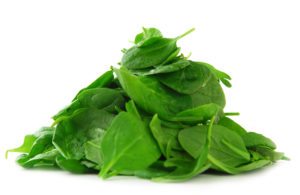Whether you eat it steamed, cooked, canned or raw, spinach nutrition can provide a foundation in your  battle to slow down the aging process and prevent degenerative diseases. This leafy green vegetable is one of the most nutritious foods you can consume. Because of its high ORAC value and nutritional density, I use spinach as the base for my ORAC Shake and Salad. Here’s a brief overview of its health benefits and why spinach is important to include it in your diet:
battle to slow down the aging process and prevent degenerative diseases. This leafy green vegetable is one of the most nutritious foods you can consume. Because of its high ORAC value and nutritional density, I use spinach as the base for my ORAC Shake and Salad. Here’s a brief overview of its health benefits and why spinach is important to include it in your diet:
Improves heart health
Improves blood pressure
Provides cancer protection
Helps prevent osteoporosis
Acts as an anti-inflammatory
Improves cognitive function
Protects against macular degeneration and cataracts
Prevents migraine headaches
Prevents atherosclerosis and plaque deposits
Supports your energy needs
That’s an impressive list all designed to keep you young and healthy as you age.
Spinach Nutrition and Health Benefits
I’ll leave the canned spinach to Popeye. And, I’m not a big fan of cooked or steamed spinach but I love the delicate texture and great taste of raw spinach. Whatever way you like it, spinach nutrition is a key foundation for the following health benefits:
Heart Health – Spinach is an excellent source of folate. Your body needs folate to keep your homocysteine levels low to prevent a heart attack or stroke. Folate is also used in the production of healthy red blood cells to prevent anemia. This is especially important for African Americans who suffer from sickle cell anemia or sickle cell trait.
Blood Pressure – Spinach is an excellent source of magnesium which can help to lower high blood pressure as well as protect against heart disease. According to research from the Journal of Agriculture and Food Chemistry, spinach also contains four peptides that block the same enzyme that ACE inhibitor drugs block to lower blood pressure. The good news is that spinach doesn’t have side effects and usually works within 2 to 4 hours of consumption. The quantity needed to produce this result is an entrée-sized spinach salad or one serving of steamed spinach.
Cancer Prevention – Researchers have identified over 10 different flavonoid compounds in spinach that can act as anti-cancer agents for stomach, breast, colon and skin cancer. Spinach nutrition also contains a carotenoid called neoxanthin, which causes prostate cancer cells to self-destruct. The famous Nurses Health Study, which followed 66,940 women, revealed that those who had a diet rich in the flavoinoid kaempferol had a 40% reduction in the risk for ovarian cancer. Spinach, non herbal tea, onions, curly kale, leeks, broccoli and blueberries are all good sources of kaempferol.
Osteoporosis – Spinach is an excellent source of calcium and magnesium, which are bone building nutrients and important for proper heart function.
Anti-Inflammatory – Most degenerative diseases have an inflammatory component. Because spinach contains beta-carotene, vitamin C and vitamin K, nutrients shown to have anti-inflammatory properties, it can be helpful to those with asthma, osteoarthritis, osteoporosis, and rheumatoid arthritis.
Cognitive Function – The Chicago Health and Aging Project showed that those who ate 3 servings of green leafy, yellow and cruciferous vegetables per day, versus those who consumed less than one serving per day, slowed their rate of cognitive decline by 40%. This is the equivalent of approximately five years. In animal studies, researchers have noted that certain components of spinach help to protect the brain from oxidative stress, which is one of the main causes of cognitive decline.
Eye Sight – Spinach, as well as kale and broccoli, is rich in lutein a carotenoid that protects the eyes against macular degeneration and cataracts. It’s important to remember that lutein is fat-soluble, so have your spinach salad with olive oil or a salad dressing that contains some fat. Your eyes will thank you.
Migraines – Recent research seems to indicate that magnesium and riboflavin help to reduce the frequency of migraine attacks. Spinach is an excellent source of both magnesium and riboflavin.
Atherosclerosis – When cholesterol is oxidized by free radicals it’s able to stick to and build up in your blood vessels. Over time this can gradually narrow the blood vessels. This increases the risk for a blockage resulting in a heart attack or stroke. Two key nutrients that reduce free radical damage are vitamin C and vitamin A. Vitamin C is a water-soluble antioxidant and vitamin A is a fat-soluble antioxidant. This combination of water- and fat-soluble antioxidants seems to be very effective in preventing cholesterol from becoming oxidized. Spinach is an excellent source for both vitamin C and vitamin A.
Energy – If you’re lacking energy then one of the first places to check is your iron levels. Iron is an integral component of hemoglobin which transports oxygen from your lungs to the working cells of your body. Iron is also a key factor in making sure that the enzymatic systems for energy production and metabolism are functioning properly. Raw spinach is an excellent source of iron and cooked spinach is even better. When compared to red meat, spinach nutrition is a better choice since it comes totally fat-free and at substantially less calories.
Conclusion for Spinach Nutrition
As you can see spinach has tremendous health benefits. Whether you eat it raw, steamed, cooked or canned it’s a great tool in helping to slow down the aging process. With a high ORAC value, a small amount can be consumed on a daily basis to provide you with the antioxidants needed to protect you from free radical damage.
Leave a Reply
You must be logged in to post a comment.